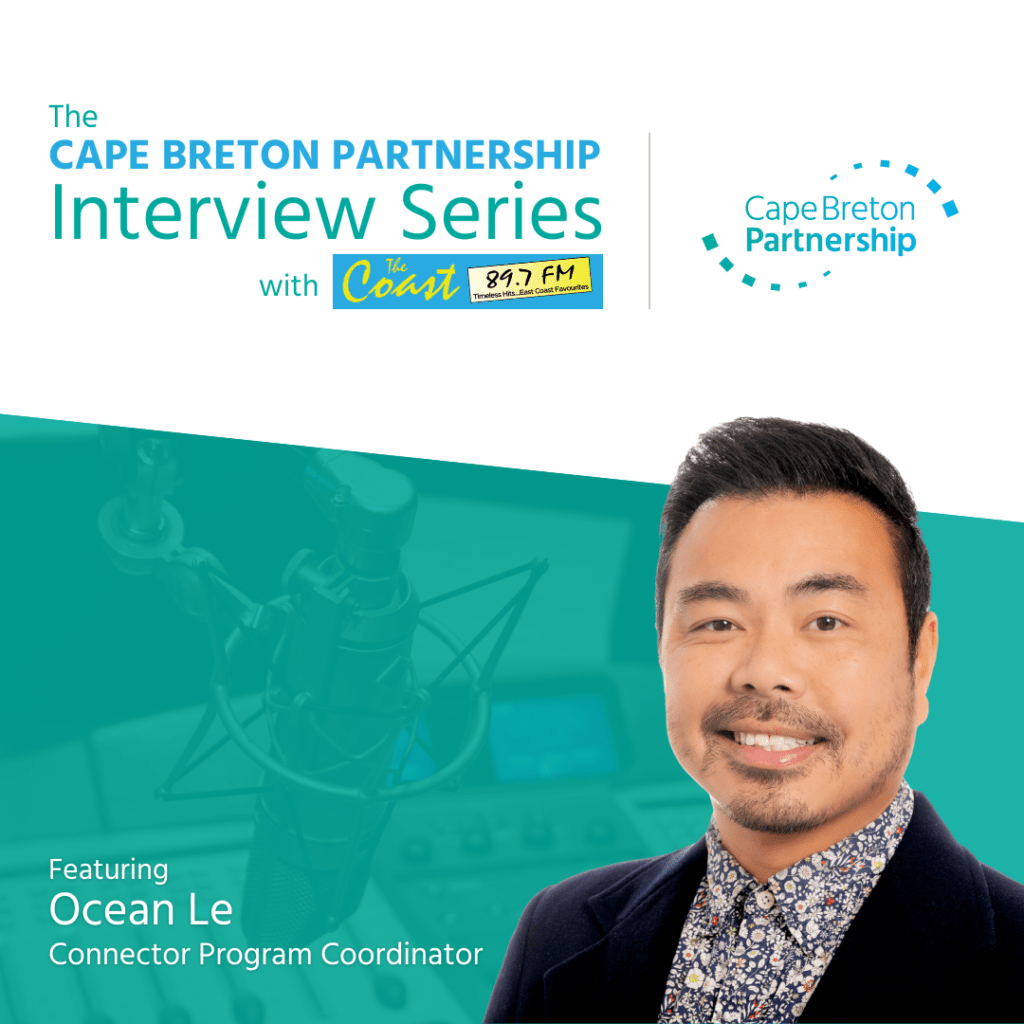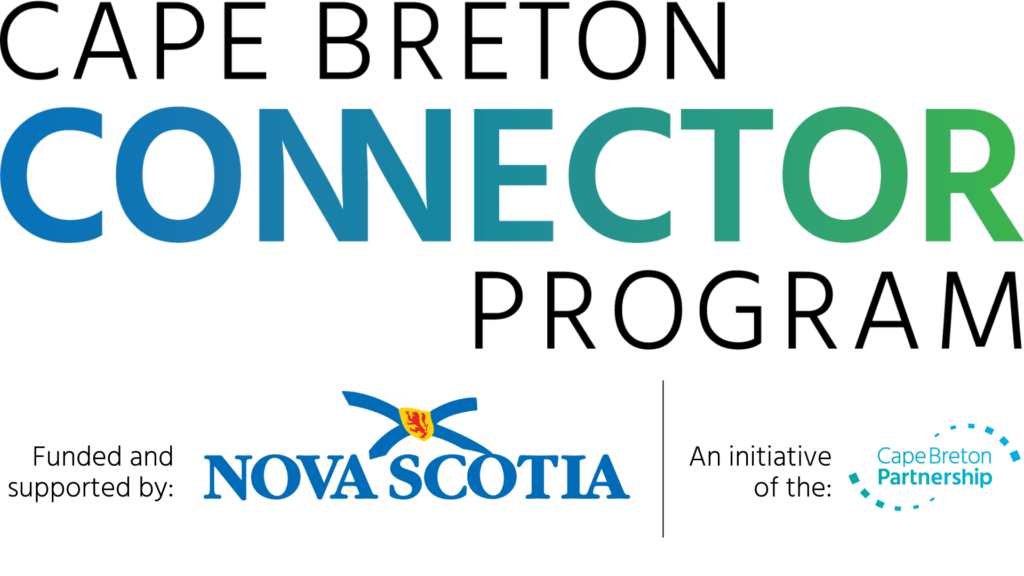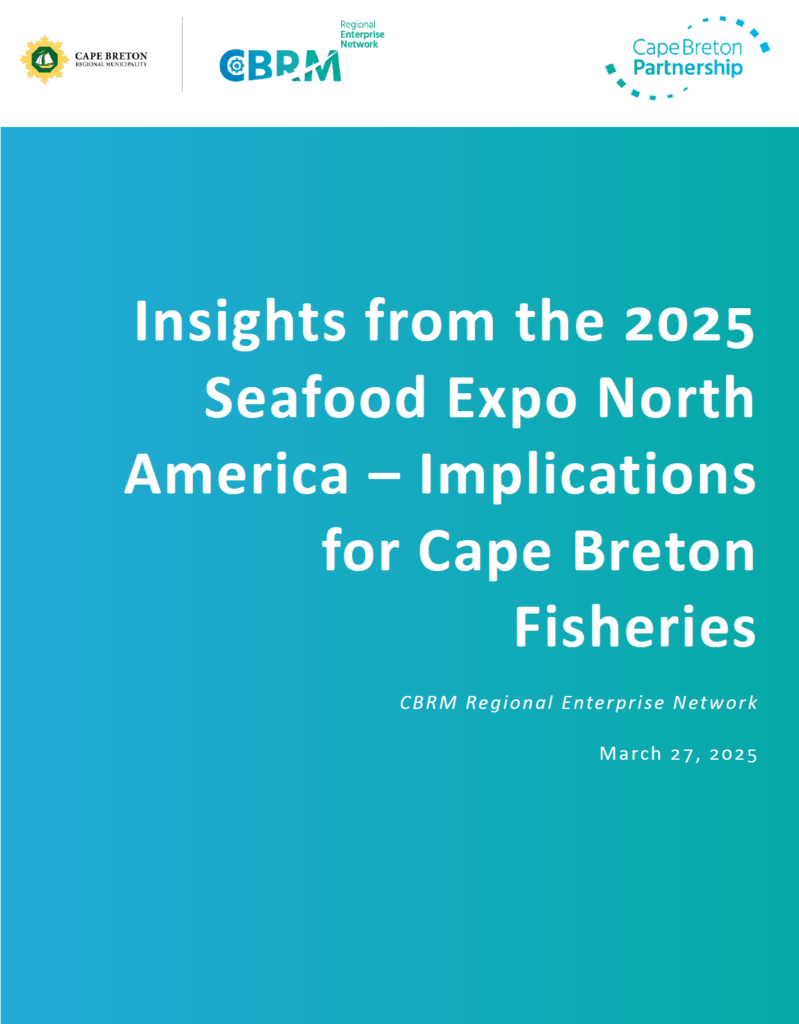Unama’ki – Cape Breton, NS – The Cape Breton Partnership is excited to announce that nominations are now open for the 2025 Economic Impact Awards which will be presented during the 2025 Investor Summit, presented by Nova Scotia Power, on October 23, 2025, at the Inverary Resort on Baddeck Bay.
Now entering its 21st year as Unama’ki – Cape Breton’s trusted private sector-led economic development organization, the Cape Breton Partnership continues its mission to support growth, innovation, and a resilient economy across the Island.
“As we continue our work in building a strong, diverse, and future-ready economy, it’s critical that we highlight those who are driving meaningful change,” said Tyler Mattheis, President & CEO of the Cape Breton Partnership. “The Economic Impact Awards are an opportunity to celebrate the visionaries and changemakers across our communities whose work is moving Unama’ki – Cape Breton forward.”
The Economic Impact Awards recognize individuals and organizations whose efforts have had a significant positive impact on the Island’s economy over the past year. Nominees are considered based on contributions made through innovation, entrepreneurship, investment, and dedication to the region.
“If you know a business, entrepreneur, or leader making a difference and you or your organization is an Investor of the Cape Breton Partnership, I strongly encourage you to nominate them,” added Mattheis. “Let’s recognize and celebrate their success together.”
Nominations will be accepted from Cape Breton Partnership Investors until 4:00 p.m. on Thursday, August 28, 2025. For more information, or to submit a nomination for the 2025 Economic Impact Awards, visit: https://capebretonpartnership.com/economic-impact-awards.
-30-
Media Contact:
Michaela Epifano, Communications & Investor Relations Specialist
Cape Breton Partnership
michaela@capebretonpartnership.com
902-562-0122
About the Cape Breton Partnership: The Cape Breton Partnership is Unama’ki – Cape Breton’s private sector-led economic development organization that supports companies and entrepreneurs by promoting our Island as a great place to live, work, and invest; growing a culture that values and celebrates creativity, innovation and entrepreneurship; and connecting entrepreneurs and companies to the resources they need to succeed. For more information, visit https://capebretonpartnership.com/.
Unama’ki – Cape Breton, NS – The Cape Breton Partnership is proud to announce that tickets are now on sale for the highly anticipated 2025 Investor Summit, presented by Nova Scotia Power, happening on October 23, 2025, at the Inverary Resort on Baddeck Bay. The Investor Summit annually brings together Unama’ki – Cape Breton’s business and community leaders for a full-day of inspiration, connection, and collaboration focused on building a more vibrant and resilient economy.
This year’s event will feature a keynote address from renowned speaker Michelle Cederberg, a powerhouse in health, productivity, and performance. For more than 20 years, Michelle has inspired audiences across North America with her dynamic, humour-infused presentations that empower busy professionals to set bold goals, recharge their energy, and elevate their performance. A newly inducted member of the Canadian Speaking Hall of Fame, Michelle’s focus is on leaving attendees feeling motivated, energized, and ready to act.
“As we continue our mission to strengthen Unama’ki – Cape Breton’s economy, the Investor Summit provides an unmatched opportunity for business and community leaders to learn, connect, and grow together,” said Tyler Mattheis, President & CEO of the Cape Breton Partnership. “We’re excited to welcome Michelle Cederberg as our keynote speaker—her message of sustainable success and peak performance complements the ambition and energy of our businesses and communities as we move forward together.”
The 2025 Investor Summit will panel discussions, networking opportunities, and engaging sessions with a focus on celebrating the adaptability and innovative approaches of the Island’s businesses and industries. The Summit’s evening includes a gala dinner, sponsored by Sydney Credit Union, and Economic Impact Awards are presented to individuals and organizations who have made significant contributions to the Unama’ki – Cape Breton economy through innovation, entrepreneurship, and new investments.
“The Investor Summit continues to be a vital space for innovation, insight, and meaningful conversation,” said Dan MacDonald, Vice-Chair of the Cape Breton Partnership Board of Directors. “Our sincere thanks to Nova Scotia Power for being our Presenting Sponsor, and to our many Investors for your continued support in building a stronger Unama’ki – Cape Breton.”
Tickets are available on a first-come first-serve basis, with early bird ticket pricing available until August 11, 2025. To purchase your ticket today, visit: https://2025-investor-summit.eventbrite.ca.
-30-
Media Contact:
Michaela Epifano, Communications & Investor Relations Specialist
Cape Breton Partnership
michaela@capebretonpartnership.com
902-562-0122
About the Cape Breton Partnership: The Cape Breton Partnership is Unama’ki – Cape Breton’s private sector-led economic development organization that supports companies and entrepreneurs by promoting our Island as a great place to live, work, and invest; growing a culture that values and celebrates creativity, innovation and entrepreneurship; and connecting entrepreneurs and companies to the resources they need to succeed. For more information, visit https://capebretonpartnership.com/.
About the Cape Breton Partnership Investor Summit: The Annual Cape Breton Partnership Investor Summit welcomes business, community, and government leaders from across Unama’ki – Cape Breton and beyond for a full day of celebrating, discussing, and growing our economy. This annual event has included insights and updates from 100+ local business and community leaders since it first began, highlighted with inspirational and engaging keynote speakers who have sent the event’s audience home with newly energized ideas and motivations to grow their businesses and communities, including celebrated business-person, leader, and star of CBC’s Dragon’s Den Arlene Dickinson (2024 Investor Summit Keynote Speaker).See recap and highlights of the 2024 Investor summit here: https://capebretonpartnership.com/recap-highlights-2024-investor-summit/.
The Cape Breton Partnership is proud to share biweekly interviews with our team and programs this summer and fall, thanks to our valued Partner and Investor, The Coast Radio 89.7!
These interviews share a glimpse into our services and the team members bringing them to communities across Unama’ki – Cape Breton, hosted by The Coast Morning Show’s Bill Bradley.
This week’s interview features the Cape Breton Connector Program and Ocean Le, Cape Breton Connector Program Coordinator for the Cape Breton Partnership!
These interviews took place between the fall of 2024 and early 2025.


The seafood industry has a long and rich history in Unama’ki – Cape Breton. The island exports an estimated $342 million dollars worth of lobster, snow crab, and other species, much of it processed by one of the island’s eleven active processing facilities. How are tariffs—both real and potential—affecting local seafood exports? How are processors navigating market uncertainty? What are the opportunities hiding in this crisis? In Episode 7 of Invest in Cape Breton, Victoria Co-operative Fisheries General Manager Osborne Burke and Louisbourg Seafoods Sales Manager Shaowei Xu lend their insights.
This episode is brought to you by Victoria Co-operative Fisheries, seafood harvesters and processors since 1955. Their progressive Cape Breton co-op works with community harvesters to bring the freshest, tastiest seafood to markets all over the world.
Listen now, or read on for a few highlights.
The Impact of Tariffs on Exports
The seafood value chain in Cape Breton is currently grappling with the looming spectres of tariffs. Since January 2025, the possibility of tariffs from the U.S. has been on the table. Meanwhile, a tangible 25% tariff from China has put a strain on the island’s fisheries.
Shaowei says Louisbourg Seafoods is heavily reliant on the Chinese market for its lobster and whelk sales, and an already-shrinking market is likely to shrink further as tariffs increase prices. Victoria Co-op Fisheries doesn’t sell directly to China but may be indirectly impacted as some of their buyers repack their lobsters and ship them by air to China. The threat of U.S. tariffs has both processors accelerating their efforts to find new markets.
Market Diversification
In response to these challenges, both Louisbourg Seafoods and Victoria Co-operative Fisheries have turned their sights toward market diversification. Shaowei says international trade shows and missions to Asia and Europe that were once part of Louisbourg Seafoods’ medium term plans have a new urgency to them. The company is also exploring opportunities in Ontario and elsewhere in Canada.
The Co-op is aggressively working to flip the 65% share of its products going to the U.S. to any market but the U.S. He sees promising opportunities domestically as well as in Asia and Europe where Canada has free trade agreements. In emerging markets like Vietnam or Taiwan with large populations and an appetite for premium seafood, Osborne says one good customer can go a long way.
Innovations in Processing and Packaging
Capitalizing on processing and packaging innovation, Victoria Co-operative Fisheries has already begun expanding its product range. From retail-friendly packaging sizes to more value-added processing, these shifts are designed to add increased value to each pound of seafood processed, compensating for potential quota reductions and market shifts.
Overcoming Operational Hurdles
Beyond tariffs, the seafood industry in Unama’ki – Cape Breton faces operational challenges at the grassroots level—from labor shortages to housing constraints for temporary workers. Both Shaowei and Osborne highlight these persistent hurdles, urging supportive government policies to facilitate immigration, workforce development, and infrastructure investments.
Resilience and Optimism
Despite these challenges, both Osborne and Shaowei express resilience and cautious optimism, rooted in the industry’s history of resilience and an adaptable workforce.
Subscribe to the Invest in Cape Breton podcast
New episodes of Invest in Cape Breton are coming. Subscribe or follow now on your favourite podcast platform to be notified when they drop. If you’re enjoying the series, consider leaving us a rating or review.
The following is a statement from the Cape Breton Partnership on the evolving response to the Tariffs on Canadian products being presented by the United States. As further updates and resources are made available, this space will be updated.
As Premier Houston stated earlier this week, “In the past few months, we’ve seen Canada’s relationship with the United States drastically evolve. We’ve lived on pins and needles wondering if the U.S. would honour its trade agreements and respect our long-standing relationship as friends and allies.”
This week, we are collectively relieved that the most recent US Tariff decisions are less impactful to Canada, Nova Scotia, and specifically Unama’ki – Cape Breton; however, the radical change in US trade policy remains of great concern.
In addition, tariffs between China and Canada are also having a negative impact, especially on our seafood sector.
Many of the most successful businesses of our region, province, and nation are global traders, and the Cape Breton Partnership looks forward to the re-establishment of a strong trading relationship with the United States, as well as strengthened and renewed relationships with European, Asian, South American and Caribbean partners that are easily accessible through our Ports and Airports.
Our region is encouraged by the actions taken by the Federal and Provincial governments, as well as the resilience shown in our regional business leaders in traditional sectors such as fishing, emerging sectors such as green energy, and essential local economic sectors such as food production.
If your business is experiencing difficulties or is seeking new opportunities, we encourage you to reach out to individual staff members of the Cape Breton Partnership on our website, or requesting a contact using our Contact Us form. Our team of economic development professionals (alongside our dedicated colleagues across the Island, the province, and Atlantic Canada) is here to provide direct support.
Whether you need assistance navigating trade challenges, exploring new markets, or accessing resources to enhance resilience and growth, we are ready to help with our own programs, or connect you to partners whose resources better fit your needs.
Three examples of support and advice we encourage you to learn more about:
- Nova Scotia Loyal: The Province of Nova Scotia’s Nova Scotia Loyal program helps consumers and businesses find local products more easily. Find your local producers and products here: https://nsloyal.ca/en.
- Tariff Response Hotline and Survey: Understanding the perspectives and concerns of Nova Scotia businesses and individuals will help inform the government’s approach. Complete the tariff response survey to share your questions and ideas. Learn more here: https://novascotia.ca/tariffs/
- Sector-Specific Information and Advice from our team, including the recent “Insights from the 2025 Seafood Expo North America” available below on this webpage.
We are confident that the communities, peoples, and businesses of Unama’ki – Cape Breton are well-positioned to adapt and learn from the uncertainty we collectively face today to emerge stronger and more competitive than ever. As our team has often said, the key is to continue moving forward, together.
Sincerely,
Tyler Mattheis, President & CEO
Cape Breton Partnership
As the businesses, communities, and residents of Unama’ki – Cape Breton are well aware, the United States of America has now put into place the tariffs that were announced earlier this year. The Cape Breton Partnership recognizes the significant risk of trade challenges now facing our country and Atlantic Canada specifically, and we want to reaffirm our commitment to supporting businesses in Unama’ki–Cape Breton and across the region. The newly imposed U.S. tariffs on Canadian exports and energy will undoubtedly create hurdles, but our community has a long history of resilience, adaptability, and innovation.
Now, more than ever, we must come together to strengthen our local economy, explore new market opportunities, and build a more diversified and competitive business landscape.
If your business is experiencing difficulties or seeking new opportunities, we encourage you to reach out to individual staff members of the Cape Breton Partnership on our website, or requesting a contact using our Contact Us form. Our team of economic development professionals—alongside our dedicated colleagues across the island, the province, and Atlantic Canada—is here to provide direct support. Whether you need assistance navigating trade challenges, exploring new markets, or accessing resources to enhance resilience and growth, we are ready to help.
Two examples of support:
- Hosted by Invest Nova Scotia, an Information session on funding programs designed to support Canadian businesses in expanding globally, happening March 19, 11:00 am– 1:00 pm: Federal Programs for Expansion and International R&D Collaboration Tickets, Wed, Mar 19, 2025 at 11:00 AM | Eventbrite; and
- The Province of Nova Scotia has launched and expanded the Nova Scotia Loyal campaign, helping Nova Scotia’s find local products easier, and facilitating Nova Scotian Producers and Retailers in highlighting their great Nova Scotian products. Find out more about the Campaign at https://nsloyal.ca/en.
Together, we will move forward, together, ensuring our businesses not only weather this period but emerge stronger and more competitive than ever.
Sincerely,
Tyler Mattheis, President & CEO
Unama’ki – Cape Breton has a deep-rooted history of trade, manufacturing, and resilience. Long before European newcomers arrived, the Mi’kmaq had established a thriving system of regional trade built on reciprocity, negotiation, and trust. This tradition laid the foundation for the Treaties of Peace and Friendship in the late 18th century, shaping the region’s economic and social fabric. It also influenced the Watertown Treaty between the Mi’kmaq and the United States—the first international treaty signed by the U.S. after its Declaration of Independence.
Today, Unama’ki – Cape Breton continues to build on this legacy. Our communities are welcoming new families, industries are attracting investment while driving innovation, and our trade networks are evolving. While recent announcements and trade actions between Canada and the United States present challenges, the Cape Breton Partnership remains committed to strengthening our economy through investment, population growth, and innovation. As our nation’s largest trading relationship faces uncertainty, we are diversifying by expanding partnerships within Nova Scotia, across Atlantic Canada, and with international markets such as the European Union and India, leveraging agreements like the Canada-EU Trade Agreement, and strengthening both educational and business connections.
The Cape Breton Partnership recognizes the importance of a stable trade relationship with our long-standing partners in the United States. In the face of potential tariffs, organizations, businesses, institutions, and communities of Unama’ki – Cape Breton remain resilient and resourceful. Looking ahead, focus will be on three key priorities:
- Promote our Island as a great place to live, work and invest – with an added emphasis on promoting our own goods to each other, and to new trading partners next door or across the globe;
- Support and celebrate our culture that values and celebrates creativity, innovation, risk-taking and entrepreneurship – so that we are prepared not only for the uncertainties of today, but so that we can thrive and prosper from future changes and opportunities as they arise;
- Connect entrepreneurs, companies, and our neighbours to the resources they need to succeed – be that economic data, a new business contact, or a new program designed to help navigate a changing marketplace.
While challenges exist, we remain confident that Unama’ki – Cape Breton will emerge stronger, with a more diversified supply chain, enhanced food security, and increased interprovincial and international trade opportunities. By embracing change, fostering new partnerships, and standing together as a resilient community, we will ensure a bright future for our region.
Sincerely,
Tyler Mattheis, President & CEO
Request a Contact
Would you like a member of our team to reach out to you? Click below to expand and fill out the contact form.
Sector-Specific Supports & Resources
- Insights from the 2025 Seafood Expo North America – Implications for Cape Breton Fisheries
- The 2025 Seafood Expo North America highlighted critical challenges and opportunities for Cape Breton’s seafood industry amid ongoing 25% U.S./China tariffs.
Provincial Supports & Resources
To support local businesses during this time, the Province of Nova Scotia has introduced resources for those impacted by U.S. trade policies.
- Business owners are encouraged to share their concerns about barriers to expanding into interprovincial or international markets by completing a survey at https://novascotia.ca/tariffs. The Province will take that information into account as it moves forward with its tariff response.
- Additionally, a tariff information line (1-800-670-4357) is available for assistance, with business navigators providing follow-up support.
With over 29,000 Nova Scotian jobs tied to U.S. exports, maintaining strong trade relationships is crucial. However, the Province of Nova Scotia also encourages businesses and consumers to support local industries. Nova Scotia Loyal (https://www.nsloyal.ca) provides a platform for producers and retailers to register and connect with customers who are committed to buying locally.
Quick facts:
- In 2023, Nova Scotia exports to the U.S. were $4.4 billion and imports were $682.7 million; the leading exports were tires, fish/prepared seafood, forest products, aerospace products, and plastics;
- Nova Scotia exports to Mexico were $28.5 million in 2023 and imports were $47.6 million;
- Canada is the largest export market for 36 U.S. states and ranks among the top three for 46 states; 43 states export more than $1 billion annually to Canada;
- Nearly 70 per cent of Canadian goods exported to the U.S. are integral to manufacturing other products, directly supporting American manufacturing; and
- More than 29,000 Nova Scotian jobs depend on exports to the U.S. – about one in every 16 jobs and more than half (54 per cent) of all jobs in Nova Scotia that are supported by international exports.
Federal Supports & Resources
Updated as of April 5, 2025
- The federal government has launched the Trade Impact Program through Export Development Canada. The program will deploy $5 billion over two years, starting this year, to help exporters reach new markets for Canadian products and help companies navigate the economic challenges imposed by the tariffs, including losses from non-payment, currency fluctuations, lack of access to cash flows, and barriers to expansion.
- $500 million in favourably priced loans will be made available through the Business Development Bank of Canada to support impacted businesses in sectors directly targeted by tariffs, as well as companies in their supply chains.
- $1 billion in new financing through Farm Credit Canada to reduce financial barriers for the Canadian agriculture and food industry.
- The federal government has introduced temporary flexibilities to the EI Work-Sharing Program to increase access and maximum agreement duration.
In addition to these supports and to protect Canadian businesses from harmful takeover, the federal government has also updated the Investment Canada Act Guidelines to protect Canadian companies at a time when our economy is facing unprecedented challenges.
Additional Measures:
- Temporarily waiving the one-week employment insurance (EI) waiting period.
- Suspending rules around separation for a six-month period, so workers don’t have to exhaust severance pay before collecting EI.
- Making it easier to access EI by increasing regional unemployment rate percentages.
- Deferring corporate income tax payments and GST/HST remittances from April 2 to June 30, 2025, providing up to $40 billion in liquidity to businesses.
- Deploying a new financing facility for businesses.
- Providing more funding to Canada’s regional development agencies, so they can better support businesses.
Quick facts:
- Canada and the United States have the world’s most comprehensive and dynamic trading relationship, which supports millions of jobs in both countries. US$2.5 billion worth of goods and services cross the border every day.
- On March 4, 2025, U.S. tariffs of 25 per cent on Canadian goods and 10 per cent on energy and potash exports from Canada to the U.S. came into effect. On March 12, 2025, the U.S. imposed tariffs of 25 per cent on Canadian steel and aluminum products.
- On April 3, U.S. tariffs of 25 per cent on Canadian automobiles came into effect, targeting the auto industry and the more than 500,000 Canadians this industry supports across the country.
- The U.S. also intends to apply 25 per cent tariffs on certain automobile parts before May 3. Under the U.S. tariffs certain exclusions linked to U.S. content may be available, specifically, the application of the 25 per cent tariff only to the value of the non-U.S. content in automobiles and auto parts that qualify for preferential tariff treatment under CUSMA.
- Canada has responded to the U.S. imposition of tariffs on Canadian goods by introducing a suite of countermeasures designed to compel the U.S. to remove the tariffs as soon as possible. These countermeasures include:
- Imposing tariffs of 25 per cent on a valued $30 billion in goods imported from the U.S., effective March 4, 2025.
- Launching a public comment period on potential counter tariffs on additional imports from the U.S.
- Imposing, as of March 13, 2025, 25 per cent reciprocal tariffs on a list of steel products worth $12.6 billion and aluminum products worth $3 billion, as well as additional imported U.S. goods worth $14.2 billion, for a total of $29.8 billion to match U.S. tariffs on steel and aluminum dollar-for-dollar.
Associated Links:
- Canada-United States relations
- Canada’s response to U.S. tariffs on Canadian goods
- The Canada-United States-Mexico Agreement (CUSMA)
- Prime Minister Carney meets with premiers to discuss Canada’s response to U.S. tariffs
- Prime Minister Carney speaks with President of the United States Donald J. Trump
Additional Supports & Resources
- Government of Canada – Canadian Customs Tariff Information
- Export Development Canada – Tariffs 101: What are tariffs and how do they impact international trade?
- BDC – Resources to support businesses in the face of trade uncertainty
- Economic Developers Association of Canada – Tariff Updates
- Excellence in Manufacturing Consortium (EMC) – Canada/US Trade Relations

